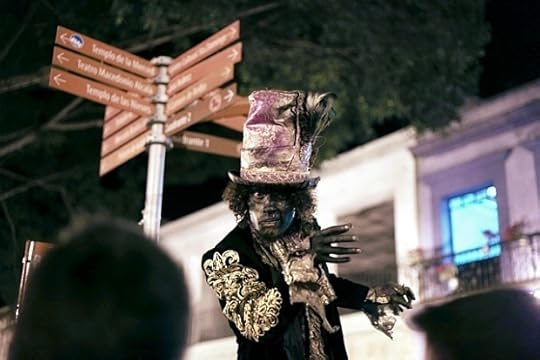Sean Jacobs's Blog, page 613
September 26, 2011
Liberator Magazine
September 25, 2011
Africans in America
Outsourcing Protest
This is either a bad joke, an art project or another Dutch viral campaign:
A group called Actie Lab (translated: Action Lab), based in Amsterdam, has found a way for Europeans to 'help' Africans by outsourcing protests to Malawi and South Africa. Basically you don't have to do protesting anymore where fill out a form on Aksie Lab's website and Aksielab "gets a bunch of Africans to protest for you." They also do birthday greetings. All rights for the videos of course reverts to Aksielab. Since they started in May they've had more than a few clients.
What's Up Africa!'s Ikenna Azuike thinks it's real.








September 23, 2011
Music Break / Kern Koppen
You might remember the Dutch band Kern Koppen from last year's collaboration with South African artists Zuluboy, Zonke and EJ von Lyrik. (At the occasion of the World Cup, they called it Skop Gat.) Why their subsequent hit 'Me Eigen' didn't travel beyond Holland's airwaves, I still don't know. The above music video ('Geen Zweet'/No Sweat) is more recent. Low Countries soul at its best. About all those orange hatters plunging themselves into the sea: that's what they do, each New Year.
See you Monday.








The "colorful" women of Karamoja
By Dan Moshenberg
Somebody call Paul Gauguin. The site of exotic exploration of bare naked, happy "backward", "traditional", and yet, magically, beautiful women has moved from Tahiti to Karamoja, in northeastern Uganda. According to media responses to the exhibition, "Colours of Karamoja", held a couple of weeks ago at the MishMash Gallery, in Kampala, the women of Karamoja "radiate energy and power" with their "love of bright colours and physical adornment."
But the women of Karamoja are a bit more than a blank palette on which bright colors are splayed. A lot more, actually.
The Karimojong are pastoralists. The men raise herds, mostly cattle, and raid the herds of other groups. The women and children mostly tend to the households and crops. That was the plan, and it worked for a while. Then the ivory traders brought guns, and, next, the army brought AK47's. This meant that cattle rustling turned from highly localized to massively lethal. Men were being killed right and left, in furious battles that then became "intractable conflict". For women, the fields became too dangerous as well, and so women had to find other means to survive, and they did.
The women of Karamoja had always brewed beer, for ritual and ceremonial purposes. When the guns came and the men died in greater and greater numbers, the women started brewing and distributing beer for purchase. It turns out that "colorful" women are also creative women, "innovative … in managing scarcity."
It was in the context of mounting, and seemingly never ending, internecine warfare, and intimate violence, that women became the peace makers, through a combination of persistence and creativity. In one instance, for example, "two mothers from opposing communities exchange babies and breast-feed them as a symbolic alliance between the two communities."
The women of Karamoja are survivors, creators. They were the ones who, in the catastrophic year 1971 when Idi Amin took power, were attacked and stripped by soldiers, and were forced to crush their beads and melt their wedding bands. Those beads the women of Karamoja wear today are not simply adornments.
The women of Karamoja do indeed wear bright colors and physical adornments, which are indeed stunning. Those necklaces and beads,however, do not emerge from "tradition" or "backward culture". They come out of a women's history of struggle.








Today I'll eat for Belgium
Yes, some Europeans, specifically Belgians — who else but "a fine group of web designers, web developers, communication specialists, tech, boys and girls" — came up with this idea. So if someone asks you why you need another piece of cake, just say "I'm eating for Africa." To help starving "people and children" in East Africa.
Get people to eat. Endless opportunities for creative people like you.








Karl Marx was right
The mainstream (media, experts, free market boosters, etcetera) and rightwingers who usually operate in delusional essentialisms (capitalism eventually works for all of us; if you're poor, or fail, it's your own fault; the world's resources will never run out; trade unions hold people back, etcetera), are second-guessing themselves. In a strange twist, they taken to reading Karl Marx's critiques of capitalism to make sense of the global economic meltdown. Basically, they're concluding Marx was right after all. (We'll leave their motives out of it for minute.)
Two recent examples: First up, has been New York economist and professed free marketer Nouriel Roubini, who told The Wall Street Journal in late August:
Karl Marx had it right. At some point capitalism can self-destroy itself because you cannot keep on shifting income from labour to capital without not having excess capacity and a lack of aggregate demand, and that's what's happening.
More recently Harvard Business School professor Umair Haque, also praised the old Communist intellectual. Haque's recent book, btw, was titled: "A New Capitalist Manifesto." Get it.
Writing on his HBS blog, Haque–after apologizing for even bringing up Marx's name–asks: "Was there maybe a tiny mote of insight or two hidden in Marx's diagnoses of the maladies of industrial age capitalism?" He then takes the reader through some of Marx's ideas about immiseration, crisism stagnation, alienation, false consciousness and commodity fetish. It is worth repeating some highlights here:
… Crisis. As workers were paid less and less, capitalism would be prone to chronic, perpetual crises of overproduction — for they wouldn't have the means to purchase or invest in enough goods to keep the economy humming. As Marx put it, there was likely to be "poverty in the midst of plenty." How's Marx doing on this score? Not bad, I'd say: the last three decades have in fact been characterized by global crises of what you might crudely call overproduction (think: too little demand chasing too many disposable widgets, resulting in a massive global debt crisis, as vanishing middle classes took on more and more debt to compensate for stagnant real wages).
Stagnation. Here's Marx's most controversial — and most curious — prediction. That as economies stagnated, real rates of profit would fall. How does this one hold up? On first glance, it seems to have been totally discredited: corporate profits have broken through the roof and into the stratosphere. But think about it again, in economic terms: Marx's prediction concerned "real profit," not just the mystery-meat numbers served up by beancounters, and chewed over with gusto by "analysts." When seen in those terms, Marx might be said to have been onto something: though corporations book nominal profits, I'd suggest a significant component of that "profit" is artificial, earned by transferring value, rather than creating it (just ask mega-banks, Big Energy, or Big Food). I've termed this "thin value" and Michael Porter has described it as a failure to create "shared value." Replace "declining real profit" with "shrinking real value" and it's analogous to what Tyler Cowen and I have called a Great Stagnation (though our casus belli for it differs significantly from Marx's).
Alienation. As workers were divorced from the output of their labor, Marx claimed, their sense of self-determination dwindled, alienating them from a sense of meaning, purpose, and fulfillment. How's Marx doing on this score? I'd say quite well: even the most self-proclaimed humane modern workplaces, for all their creature comforts, are bastions of bone-crushing tedium and soul-sucking mediocrity, filled with dreary meetings, dismal tasks, and pointless objectives that are well, just a little bit alienating. If sweating over the font in a PowerPoint deck for the mega-leveraged buyout of a line of designer diapers is the portrait of modern "work," then call me — and I'd bet most of you — alienated: disengaged, demoralized, unmotivated, uninspired, and about as fulfilled as a stoic Zen Master forced to watch an endless loop of Cowboys and Aliens.
False consciousness. According to Marx, one of the most pernicious aspects of industrial age capitalism was that the proles wouldn't even know they were being exploited — and might even celebrate the very factors behind their exploitation, in a kind of ideological Stockholm Syndrome that concealed and misrepresented the relations of power between classes. How's Marx doing on this score? You tell me. I'll merely point out: America's largest private employer is Walmart. America's second largest employer is McDonald's.
Commodity fetishism. A fetishized object is one which is more than a symbol: it's believed to have actually the power the symbol represents (like an idol, or a totem with magical properties). Marx claimed that under industrial age capitalism's rules, commodities became revered talismans, worshipped through transactional exchanges, imbued with mystical powers that give them inherent value — and obscuring the value of and in the very people who've worked labored over them in the first place. It's one of Marx's most subtle and nuanced concepts. Does it hold water? Again, I'll merely pointing to societies in furious pursuit of more, bigger, faster, cheaper, nastier, now, whether it's the retail temples of America's mega-malls, or London rioters stealing, not bread, but video games.
To date Haque's post–it went online September 7th–has had more than 650 (!) comments and despite his plea that " … this is a divisive topic," exhorting his readers to "stay civilized, enlightened, and keep a sense of humor" and urging them to "… discuss the issues and ideas in the comments — not just defend ideologies by pointing fingers and calling one another names," the comments are a sight to behold.
* BTW, for beginners who want to start with good, readable studies of Marx and his ideas I'd recommend Eric Hobsbawn's new book (we posted a link to a review of Hobsbawn's here) and literary academic Terry Eagletona new book. (Here Eagleton writes about the book.)
H/T: Peter Dwyer.








'Nigeria's own Donald Trump'
MTV Base, the music channel's African subsidiary carried on satellite TV, have been making these upbeat video features, where a group of upwardly mobile young Africans–most based on the continent–interview leading businesspeople, entertainers and a few public representatives (I spotted Julius Malema and Paul Kagame in the series promo). At the same time the interviewers are also profiled. The videos come in at 20 minutes or so and are sponsored by cell phone company, MTN.
A few are online. The first is an interview with Nigerian business tycoon, Aliko Dangote, who has a reputed net worth of US$13.8 billion and is the 51st richest man in the world. The presenter hypes Dangote as "Nigeria's own Donald Trump" which is odd since Trump is hardly a successful businessman.
With musician Hugh Masekela (who, this time, does not show off his football skills):
And a 3rd with Nigerian business tycoon Ben Murray Bruce (cinemas, beauty competitions, television stations):
H/T: Adaora Isichei








Sunrise
Damn. Luke Daniel's picture of the sun rising over Cape Town is incredible.
* A propos, out of the 50 cities selected by Travel + Leisure as "The World's Best", Cape Town and Cairo are the only African cities. In Cape Town, the residents of Khayelitsha, Mitchell's Plain and Delft want to know who made up the jury and what criteria were used. So probably would large sections of Cairo.








September 22, 2011
Music Break / Kastra
Video for Douala rapper Kastra. I haven't yet figured out what he means with "I'm your brown cacao in your black cappuccino." And what's with the line " … call me Chris Brown only if you're Rihanna"? But the music pushes all the right buttons.








Sean Jacobs's Blog
- Sean Jacobs's profile
- 4 followers
























